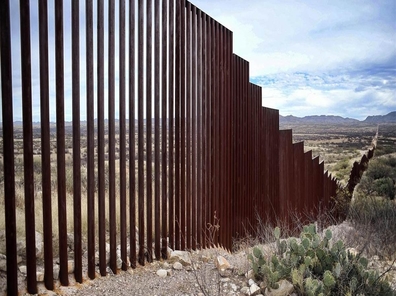
As is evident to all but the comatose or narcolepts among us, about a fourth of the government is now on an enforced furlough because of lack of funds thanks to the dispute between the president and Democrats (and a few Republicans) over providing appropriations to expand and fortify a physical barrier on our southern border.
After some initial waffling about whether he would hold firm, or for how much, the president dug in his heels and said he'd veto anything sent to him that didn't include a substantial down payment on what he wanted. Exactly how much a satisfactory amount consists of is not quite known, although some administration officials have been signaling the number $2.1 billion (as opposed to his initial throw-down of slightly more than $5 billion).
When challenged and scoffed at by critics, via the podium in the Senate chamber as well as by tweets and other social media means, for demanding an appropriation of taxpayer funds after multiple promises that Mexico would pay for the wall, the president responded that Mexico would in fact be paying for it, albeit indirectly, through improvements in the U.S.-Mexico-Canada (USMCA) trade agreement intended to replace NAFTA.
Never one to miss a chance to troll the president, Rep. Sheila Jackson Lee (D-Texas) has introduced a bill that would legislatively prohibit construction of a wall unless Mexico is overtly paying for it. The bill will never become law as long as Republicans hold the Senate, but it might very well pass the newly constituted Democratic majority House come January.
Frankly, the USMCA "indirect payment" claim is a pretty thin gruel to swallow. My review of the agreement has led me to question whether anything much has been gained where immigration is concerned, and I'm not the only skeptic on the issue.
Be that as it may, I firmly believe that a physical barrier is absolutely crucial to federal border enforcement efforts for reasons I've explained in a recent post.
One way that the president might have worked with Congress to obtain the funds was through a tax on remittances sent abroad, much of which is derived from aliens working illegally in the United States who send funds back to relatives in their home countries. Such a tax is something we at the Center have discussed at length and continue to believe should be done to curb the flow of outbound money that is permanently lost to our economy, whether or not the income to the Treasury ends up apportioned to the wall or not. But, for reasons known only to the president, that path was never pursued.
Now, along comes a third way: H.R.7325, the Border Bonds for America Act of 2018, introduced by Rep. Steven Palazzo (R-Miss.), "To provide for the issuance of revenue bonds to fund construction of a physical border barrier and related technology, roads, and lighting along the United States border with Mexico." The bill would provide for the issuance of federal government bonds to fund the wall. Will it gain traction? I doubt it, especially not once the House is once again controlled by Democrats.
But it's not a bad idea at all. It is a means by which the government could test the popularity of the wall: If investors buy these bonds, it certainly signals that they in some way, shape, or form support the construction of a barrier, and might in the end even make a profit doing so, in the same way that you earn interest on any other government-issued bonds.
Take a look at this Gofundme crowdfunding campaign. Some enterprising private citizens established it to pay for the wall and in a relatively short time, it's already accrued more than $18 million and is rising daily. If that's any illustration of interest, my guess is that a border barrier-oriented revenue bond would do well. Hello! Is anyone in Congress listening?
